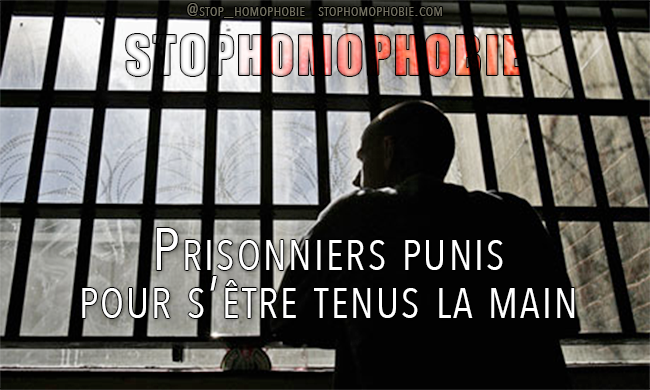Les relations sexuelles et amoureuses entre prisonniers sont le plus souvent réprimées par les autorités carcérales. Une Commission indépendante a rendu son rapport sur la sexualité en milieu carcéral, en Angleterre et au Pays de Galles. Elle pose la question des vexations et des punitions qu’encourent les prisonniers ayant des rapports amoureux avec leurs codétenus, alors que les autorités pénitentiaires interdisent toute relation sexuelle derrière les barreaux, relève «The Guardian».
À cran en permanence
«J’ai constaté que des prisonniers ouvertement gay pouvaient être séparés et changés de secteur, simplement parce qu’ils étaient ‘ensemble’, sans qu’il y ait la moindre activité sexuelle entre eux», a raconté un détenu aux membres de la commission. Un autre raconte: «Les gardiens ouvraient ma porte brusquement, pour essayer de nous surprendre en train d’avoir des relations sexuelles. Évidemment, ça n’a jamais marché, mais ça nous mettait à cran en permanence. Une fois, ils nous ont trouvés alors que l’on se tenait par la main en regardant la télé. On nous a ordonné d’arrêter et de nous asseoir séparément, sinon nous recevrions une pénalité.»
Discrimination
Des représentants d’organisations LGBT ou d’ONG actives dans la santé sexuelle critiquent cette situation. Elles estiment que les détenus gay et lesbiennes font l’objet d’un traitement abusif et discriminatoire, alors qu’ils ne représentent qu’un portion minime de la population carcérale. En forçant les détenus à se cacher encore davantage pour avoir des relations sexuelles, les autorités pénitentiaires augmentent, en outre, le risque de propagation d’infections sexuellement transmissibles. Chris Sheffield, un ancien direteur de prison qui dirige la commission, rappelle que les établissements «doivent s’assurer qu’ils protègent les plus vulnérables» en se montrant plus souples vis-à-vis de cas individuels.
Pour l’instant, les autorités carcérales campent sur leurs positions: les relations sexuelles en cellule doivent être bannies pour la sécurité des détenus. En effet, selon elles, il est souvent extrêmement difficile de distinguer rapports consensuels et forcés entre prisonniers.
>> In English
Prisoners have told an independent commission that the policy of separating prisoners believed to be in a sexual relationship was discriminatory towards openly gay prisoners.
Sexual health charities, including the National Aids Trust, have also warned that attempts to control consensual sexual activity between prisoners risk undermining efforts to promote safe sex and prevent the spread of HIV, such as access to condoms.
The commission on sex in prison, set up by the Howard League for Penal Reform, is made up of academics, former prison governors, health experts, a former prisons minister and a former solicitor-general.
It says in its first briefing paper that although it is clear that some male prisoners are having sex, there has been little research on consensual activity and little reliable data.
The British Association for Sexual Health and HIV told the commission that evidence of sex in prison was largely anecdotal but widely reported in male and female prisons.
But while female prisoners were quite open with clinical staff about sex with other prisoners, this was not the same in male jails where denial of sexual activity was more common. « This may be because male prisoners perceived there was more of a stigma attached to men who have sex with men, » says the commission’s briefing paper.
The Terence Higgins Trust said that prison officers believed prisoners did have sex but that it was rare for people to be found engaging in sex. The trust said the fact that homophobic attitudes were more pronounced among young men inside jails than in the community could account for the reluctance of male prisoners to admit to sex with other men.
Sexual health workers used the term « heteroflexible » to describe men who identify themselves as heterosexual but are flexible about having sex with men while they are in prison. Prisoners serving longer sentences were more likely to acknowledge a gay identity. Although there is no prison rule banning sex between prisoners, prison staff do not allow prisoners to have sex. Prison governors say it is difficult, if not impossible, for prison staff to be able to distinguish between consensual and coercive sexual relationships between prisoners.
One gay prisoner told the commissioners: « In the four prisons I have been held at, I have never been aware of any prisoner being charged for having consensual sex with a cell mate. I have however witnessed openly gay partners being split up and moved to other wings, simply because they were ‘together’, although no sexual activity had taken place. »
Another inmate reported: « Officers would push open my door very quickly, unannounced, in an attempt to catch us having sex. Of course it never worked but it put us on edge all the time. A senior officer did this once as Simon and I were sat on my bed holding hands watching a movie on TV. He ordered us to stop holding hands and move apart, or he would give us an IEP [incentives and earned privileges] warning. »
Prisoners who did not want officers to know they were having sex told the commission that they were often unable to obtain condoms in confidence. The chief inspector of prisons has reported that in some jails barrier protection, dental dams, lubricants and confidential advice are all widely available while in others condoms were only available if the prisoner attended a clinic.
Chris Sheffield, a former prison governor who chairs the commission, said: « Prisons need to ensure that they protect the vulnerable. The prison population is a high-risk group for sexually transmitted infections and risk-taking sexual behaviour.
« The need for harm reduction measures and the delivery of sexual health policies are important not just for prisoners but wider society. »
A prison service spokeswoman said: « Sexual relations between prisoners are not commonplace. We do not condone sex in prisons or believe that prisoners in a relationship should share a cell. Reported incidents of sexual assault in prison are rare. »
She said that where a sexual assault was reported or discovered, it would be investigated and reported to the police as necessary.
Avec 360°


















